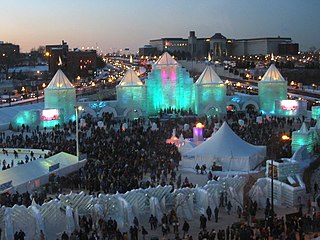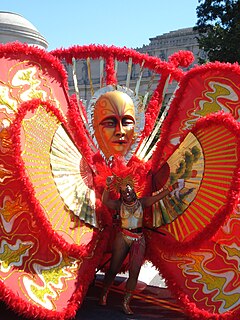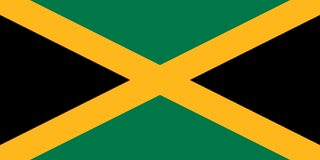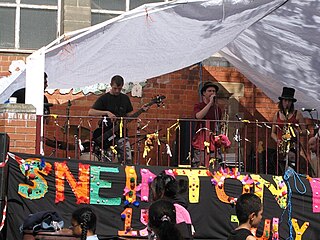A parade is a procession of people, usually organized along a street, often in costume, and often accompanied by marching bands, floats, or sometimes large balloons. Parades are held for a wide range of reasons, but are usually celebrations of some kind. In British English, the term 'parade' is usually reserved for either military parades or other occasions where participants march in formation; for celebratory occasions, the word procession is more usual. In the Canadian Forces, the term also has several less formal connotations.

Carnival is a Catholic festive season that occurs before the liturgical season of Lent. The main events typically occur during February or early March, during the period historically known as Shrovetide. Carnival typically involves public celebrations, including events such as parades, public street parties and other entertainments, combining some elements of a circus. Elaborate costumes and masks allow people to set aside their everyday individuality and experience a heightened sense of social unity. Participants often indulge in excessive consumption of alcohol, meat, and other foods that will be forgone during upcoming Lent. Traditionally, butter, milk, and other animal products were not consumed "excessively", rather, their stock was fully consumed as to reduce waste. This festival is known for being a time of great indulgence before Lent, with drinking, overeating, and various other activities of indulgence being performed. For example, Pancakes, donuts, and other desserts are prepared and eaten for a final time. During Lent, animal products are eaten less, and individuals have the ability to make a Lenten sacrifice, thus giving up a certain object or activity of desire.

The Notting Hill Carnival is an annual Caribbean festival event that has taken place in London since 1966 on the streets of the Notting Hill area of Kensington, each August over two days.
Leicester Pride is an annual LGBT pride event in Leicester, England, which started to take place in 2001.

The Toronto Caribbean Carnival, formerly known as Caribana, is a festival of Caribbean culture and traditions held each summer in the city of Toronto, Ontario, Canada.It is a pan-Caribbean Carnival event and has been billed as North America's largest street festival, frequented by over 1.3 million visitors each year for the festival's final parade and an overall attendance of 2 million.

The Leeds Carnival, also called the Leeds West Indian Carnival or the Chapeltown Carnival, is one of the longest running West Indian carnivals in Europe, having been going since 1967. The carnival is held in the Chapeltown and Harehills parts of Leeds every August bank holiday weekend. Attendance is estimated at about 150,000.

Cowley Road is an arterial road in the city of Oxford, England, running southeast from near the city centre at The Plain near Magdalen Bridge, through the inner city area of East Oxford, and to the industrial suburb of Cowley. The central shopping is at 51.746°N 1.232°W

Birmingham Pride is a weekend-long LGBTQ+ festival held annually in the Gay Village, Hurst Street, Birmingham, England, over the Spring Bank Holiday weekend. Birmingham Pride is the UK's largest two-day gay pride festival.

The Saint Paul Winter Carnival is an annual festival in Saint Paul, Minnesota, United States.

The West Indian Day Parade Carnival is an annual celebration of West Indian culture, held annually on around the first Monday of September in Crown Heights, Brooklyn, New York City. It is organized by the West Indian American Day Carnival Association (WIADCA).
The Peterborough Festival is held annually in the UK city of Peterborough. The festival takes place over a two-week period, usually the last week of June and the first week of July.

Luton International Carnival is a large carnival in Luton, Bedfordshire. The carnival is commissioned by Luton Borough Council and is artistically produced by UK Centre for Carnival Arts, which is based in Luton town centre.

The Jamaican diaspora refers to the body of Jamaicans who have left the island of Jamaica, their dispersal and to a lesser extent the subsequent developments of their culture. Jamaicans can be found in the far corners of the world, but the largest pools of Jamaicans, outside of Jamaica itself, exist in the United States, United Kingdom, Canada, other Caribbean islands, and all across the Caribbean Coast of Central America, namely Panama, Cuba, Costa Rica, Nicaragua, and Honduras.
The Godiva Procession is an annual procession in the city of Coventry, England, which re-enacts the story of Lady Godiva. Godiva Processions have been held in Coventry since the 17th century.
St. Paul's Carnival is an annual African Caribbean carnival held, usually on the first Saturday of July, in St. Paul's, Bristol, England. The celebration began in 1968 as the St. Paul's Festival, in order to improve relationships between the European, African, Caribbean and Asian inhabitants of the area.

The Northampton Carnival has had strong traditions in the town from the 1960s through the Midsummer Meadow times in the 1980s, to its short break in the late 1990s, until its revival in 2005.
Summer Sundae Fringe Festival was an annual music festival, running from 2006 to 2010 and held in Leicester, England, which focused on showcasing artistic talents and communities within the city of Leicester.
Haitian Carnival is a celebration held over several weeks each year leading up to Mardi Gras. Haitian Defile Kanaval is the Haitian Creole name of the main annual Mardi Gras carnival held in Port-au-Prince, Haiti.

Sneinton Festival is a local cultural event that takes place every July in Sneinton, Nottingham, England. The first festival was held in 1995, and is run by The Festival Group, a volunteer group made up of local residents, representatives of local organisations, community groups, schools, church, youth and play groups, artists, musicians, performers and local project workers. Since 2002, the group has been supported and coordinated by the Sneinton Community Project. Each festival is organised around three individual elements: initial workshops, a week-long festival, and lastly a carnival day.












